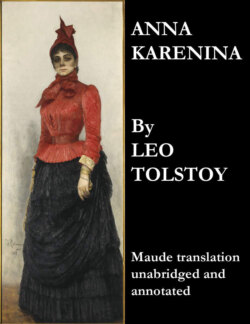Читать книгу Anna Karenina (Maude Translation, Unabridged and Annotated) - Leo Tolstoy - Страница 28
На сайте Литреса книга снята с продажи.
Chapter 21
ОглавлениеDOLLY came out of her room for the grown-up people’s tea. Oblonsky did not appear. He had probably left his wife’s room by the other door.
‘I’m afraid you will be cold upstairs,’ remarked Dolly to Anna. ‘I want to move you down, and then we shall be nearer to one another.’
‘Oh, please don’t trouble about me,’ said Anna, scrutinizing Dolly’s face and trying to discover whether a reconciliation had taken place.
‘It will be too light for you downstairs,’ said her sister-in-law.
‘I assure you that I sleep always and anywhere like a dormouse.’
‘What are you talking about?’ asked Oblonsky, entering the room from his study and addressing his wife.
From his tone both Kitty and Anna gathered that a reconciliation had taken place.
‘I want to move Anna downstairs, only the curtains must be changed. I shall have to do it myself, no one else can do it,’ Dolly answered addressing him.
‘Goodness knows if they have quite made it up,’ thought Anna on hearing her tone, which was cold and calm.
‘Come now, Dolly! always making difficulties,’ said her husband. ‘If you like I will do it all.’
‘Yes, they must have come together again,’ thought Anna.
‘I know how you’ll do it all,’ answered Dolly. ‘You will tell Matthew to do something that cannot be done and will go away yourself, and he will muddle everything,’ and as she spoke her usual ironical smile wrinkled the corners of Dolly’s mouth.
‘Yes, a full, a full reconciliation, quite complete. Thank God!’ thought Anna, and pleased to have been the means of bringing it about, she went up to Dolly and kissed her.
‘Not at all. Why do you so despise Matthew and me?’ said Oblonsky, turning to his wife with a slight smile.
All that evening Dolly maintained her usual slightly bantering manner toward her husband, and Oblonsky was contented and cheerful, but not to the extent of seeming to forget his guilt after having obtained forgiveness.
At half-past nine an unusually pleasant and happy family conversation round the Oblonskys’ tea-table was disturbed by an apparently very ordinary occurrence which yet struck them all as strange. While they were talking about their mutual Petersburg acquaintances Anna rose suddenly.
‘I have her photo in my album,’ said she, ‘and I’ll show you my Serezha’s too,’ she added with a mother’s proud smile.
For toward ten o’clock — the time when she generally said good-night to her son and often put him to bed herself before going to a ball — she felt sad at being so far from him, and, whatever they talked about, her thoughts kept returning to her curly-headed Serezha. She longed to look at his portrait and to talk about him. Seizing the first opportunity she rose and, stepping firmly and lightly, went out to fetch her album. The flight of stairs to her room went up from a landing of the well-heated front staircase. As she was coming out of the drawing-room there was a ring at the door.
‘Who can it be?’ asked Dolly.
‘It is too early to fetch me, and late for anyone else,’ said Kitty.
‘Papers from the office for me, I expect,’ said Oblonsky.
A footman ran up to announce the new arrival, who stood at the foot of the stairs under a lamp. Anna looked down from the landing where she stood and at once recognized Vronsky, and a strange feeling of pleasure mixed with fear suddenly stirred in her heart.
He stood in his overcoat, feeling for something in his pockets. When Anna was halfway up the top flight, he lifted his eyes and saw her, and a look of something like embarrassment and fear came into his face. She bowed slightly and went on. She heard Oblonsky’s loud voice downstairs asking him to come in, and Vronsky’s low, soft voice refusing.
When Anna returned with her album he had already gone, and Oblonsky was saying that Vronsky had called to inquire about a dinner they were giving next day to a celebrity who was visiting Moscow, but that he could not be induced to come in. ‘He seemed so queer,’ added Oblonsky.
Kitty blushed. She thought that she alone understood why he had come to the house and why he would not come in. ‘He has been to our house,’ she thought, ‘and not finding me in he guessed that I was here. And he would not come in because Anna is here, and he thought it too late.’
They all glanced at one another and said nothing but began examining Anna’s album.
There was nothing extraordinary or strange in the fact that a man had called at half-past nine at a friend’s house to ask about a dinner they were planning and that he would not come in; but it seemed strange to all of them. To Anna in particular it seemed strange and not right.
